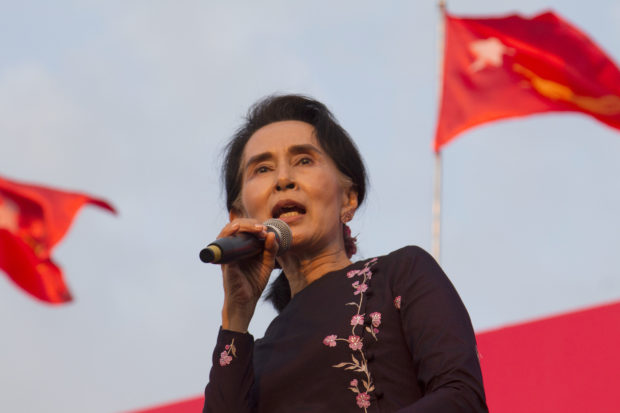
In this Nov. 1, 2015 file photo, Myanmar opposition leader Aung San Suu Kyi speaks during an election campaign rally of her National League for Democracy party for upcoming general election in Yangon, Myanmar. AP
BANGKOK — Myanmar’s government looks as if it’s under siege from an international community concerned about the condition of its nascent democracy, with widespread calls for a genocide tribunal to hold its military to account for the brutal treatment of its Muslim Rohingya minority.
But experts say not to expect any change of course from the country’s leader, State Counsellor Aung San Suu Kyi, even after a fresh round of withering criticism from abroad following Monday’s show-trial conviction of two Reuters reporters who helped expose extrajudicial killings of 10 Rohingya men and boys.
Suu Kyi’s motivations are opaque. Even as a revered pro-democracy activist, the Nobel Peace laureate had a reputation for being autocratic, but now her core ideology has come into question.
There is at least a loose consensus that she faces real restrictions on her actions due to the power retained by the military that is enshrined in the constitution it imposed in 2007.
“Aung San Suu Kyi has tried to balance her delicate and antagonistic relationship with the military and her conception of society’s needs, perhaps fearing too strident a stance could prompt an overt return to military rule, which is possible under the constitution in certain circumstances,” David Steinberg, professor emeritus at Georgetown University, wrote in July in the online magazine The Diplomat.
Other observers are less generous, saying Suu Kyi’s seeming impassivity toward the plight of the Rohingya — and hostility toward those wishing to address the issue — undercut the narrative pitting her against the military.
“People tended to think that Aung San Suu Kyi and the military were at odds, and each feared that the other would dislodge them from power,” said Khin Zaw Win, a rare outspoken critic of the government who directs the Tampadipa Institute, a Yangon-based capacity-building institution.
He said the conviction of the two Reuters journalists, who were sentenced to seven years in prison, is a reminder that “shows that what they fear in tandem is the world out there finding the truth and seeking to unseat them.”
The old saying, “They have to hang together, or they hang separately,” describes their situation, he said.
Political realities inside and outside Myanmar suggest there is neither the will nor a way to ensure justice for the Rohingya, 700,000 of whom fled to neighboring Bangladesh to escape a brutal counterinsurgency campaign by the army. Myanmar denies any large-scale human rights violations and says its actions were a response to surprise attacks by militants in August last year that killed a dozen members of the security forces. Critics charge it was ethnic cleansing.
Those inclined to bring Myanmar to account have few weapons to do so. Despite the recommendation last month of a special UN fact-finding commission that top Myanmar commanders be charged with genocide, no trial is likely to be held in the foreseeable future.
It’s far from clear that any country would officially push prosecution, and certain that several would seek to frustrate it. Major powers that have never entertained much interest in human rights — China and Russia — also have strategic reasons to cozy up to Myanmar, a well-situated outpost on the Indian Ocean.
“A tribunal at the International Criminal Court, for example, on genocide charges will be difficult to pull off,” Murray Hiebert, a senior associate at the Center for Strategic and International Studies in Washington, D.C., said in an email interview. “Not only isn’t Myanmar a member of the ICC, but a case must be brought by a member of the UN Security Council. China and Russia have made clear that they would block a case against Myanmar.”
The desire to contain China’s growing influence in Southeast Asia is a major issue.
“The US and most Western democracies want to avoid pushing Myanmar further in the arms of Beijing,” Hiebert said.
Competition with China for geopolitical influence, as well as friendship from regional countries anxious not to rock the boat or jeopardize investments, also limits the threat of unfriendly action.
“I think Myanmar can still count on most Southeast Asian countries as partners, and also India and probably Japan — Japan has been wary of taking a tough stance on the issues related to the Rohingya, for fear of losing strategic influence in Myanmar,” said Joshua Kurlantzick, a senior fellow for the New York-headquartered Council on Foreign Relations.
Sanctions — the second-line approach to pressuring Myanmar — face the same constraints as pushing for a genocide tribunal, though nations inclined to do so can act unilaterally.
Hiebert noted that U.S. Senate Majority Leader Mitch McConnell — a stalwart supporter of Suu Kyi in her Nobel Prize-winning days as a freedom fighter against military rule — remains sympathetic to her and is a roadblock to tougher action by Washington.
“I think Myanmar and most of the population will hunker down in the face of more sanctions as they have stood up to most protests over the treatment of the Rohingya over the past year,” Hiebert said. “They tell foreign visitors that they have resisted and survived sanctions before. The difference this time, of course, is that most of the population seems to support the military’s moves against the Rohingya, while in the past many people seemed to support the sanctions to put pressure on the military to move toward greater democracy.” /ee